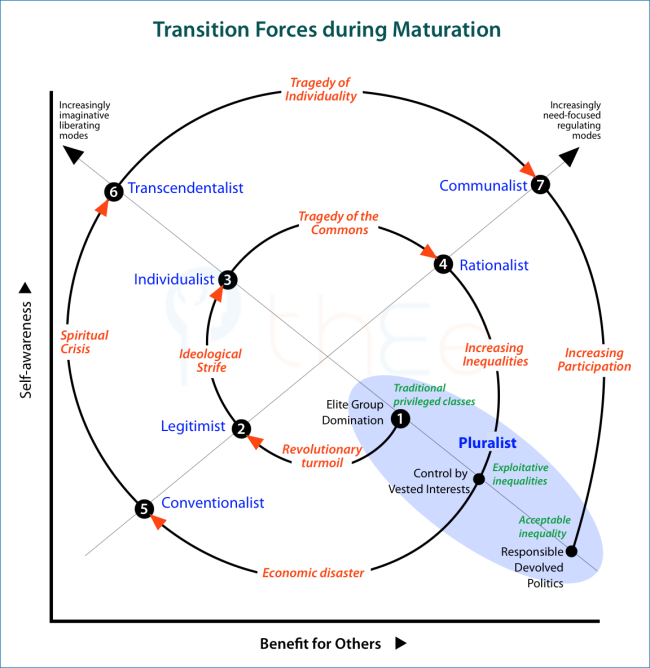Reviewing the Maturational Process
Institutions in Order of Appearance
This framework offers a schematic account that reveals deep principles in psychosocial life useful to those living within a society. In actuality many factors supervene, so that any factual account will present a complicated and messy picture.
The full matrix of features of the as they become established within any society is shown below.
Remember two key principles:
- Most features may occur at any point during development—but they are not institutionalized.
- Values and institutions of each are cumulative. Nothing vanishes, including even seemingly less desirable features.
| Strengthening the Ethos |
Mode-1 Pluralist-I |
Mode-2 Legitimist |
Mode-3 Individualist |
Mode-4 Rationalist |
Mode-1 Pluralist-II |
Mode-5 Conventionalist |
Mode-6 Transcend'ist |
Mode-7 Communalist |
Mode-1 Pluralist-III |
|---|---|---|---|---|---|---|---|---|---|
| Commonality Fundamentals | |||||||||
| Integrating Force | Culture-based ideals |
Extended enfranchisement |
Regulated markets | Independent official inquiries |
Sectional ideals |
Expressed public consensus |
Personal convictions | Communities for each & all |
Socially useful ideals |
| Socio-Political Institution | Tradition and brute power- based groups |
Rule of law | Personal enterprise | Solutions for social problems |
Interest-based groups |
Self-mobilization of civil society |
Genuine civic commitment |
Needs-based policy-making |
Communities of choice |
| Governance Requirement |
Privileged elites |
Separation of powers |
Equality of opportunity |
Regulatory authorities | Group representatives |
Norms of professionalism |
Application of ultimate values | Localism & subsidiarity |
Community leaders |
| Individuality Fundamentals | |||||||||
| Personal Benefit |
Under control of the elites | Re-distribution of wealth & rights |
Accumulation of wealth |
Safety-nets for basic needs |
Via lobbying & group pressure |
Better relations of government and the people |
Self-acceptance | Being valued by the community | Criterion of reasoned fairness |
| Social Interactions |
Authoritarian control |
Availability of courts of justice | Self-reliance | Stakeholder consultations |
Targeted monitoring |
Discussions in diverse networks |
Empathy & compassion |
Effective use of diversity |
Interpersonal & social pressure |
| Provision of Knowledge |
Propaganda & censorship |
Socialization via education |
Transparency & privacy |
Routine useful social statistics |
Via crusades & campaigns |
Multiplicity of perspectives | Accounts of psychosocial potentials |
Freedom of information |
Accessibility via multiple sources |
| Personal-Ethical Requirements | |||||||||
| Core Value | Kinship | Tolerance | Freedom | Truth | Fraternity | Equality | Harmony | Peace | Fraternity |
| Civic Virtue | Prudence | Justice | Courage | Wisdom | Prudence | Moderation | Integrity | Benevolence | Prudence |
A Shock for a Naïve Author
Confronting the nature of politics led to a realization that improvements in a people’s political state must require massive effort by all, and such an effort would never manifest without severe provocation.
This diagram shows the series of unavoidable provocations that are developed as each succeeds the previous one.

Individual/Society Relations
The diagonals are labelled to reveal the way the discrete Stages in maturation alternate between regulating and liberating individuals—but always in the service of society i.e. in the service of the members of society, not the politicians in power or ruling class.
There is no society apart from the individuals that constitute it. The reification of society and the manipulation of patriotic sentiments have been demagogic methods of control. (These may make sense as service for the State, not the Government.)
Demagogic leaders activate tendencies in people to submerge their individuality in some supreme entity. Naturally the demagogue ambitiously desires, or even feels destined, to rule that entity. When people en masse submerge, submit and lose identity, it reflects on their maturity as individuals. It also limits what is possible for their society and provides immense temptations to the leadership.
This concept of maturation is not politically pleasant. So it is unlikely it will be welcomed by elites currently in power.
- Compare maturational demands in developing political institutions.
- Consider psychosocial factors affecting political maturation in the West.
- Is there an alternative sequence?
- More on authoritarian regimes unwilling to leave .
Originally posted: July 2009; Last updated: 11-Apr-2014